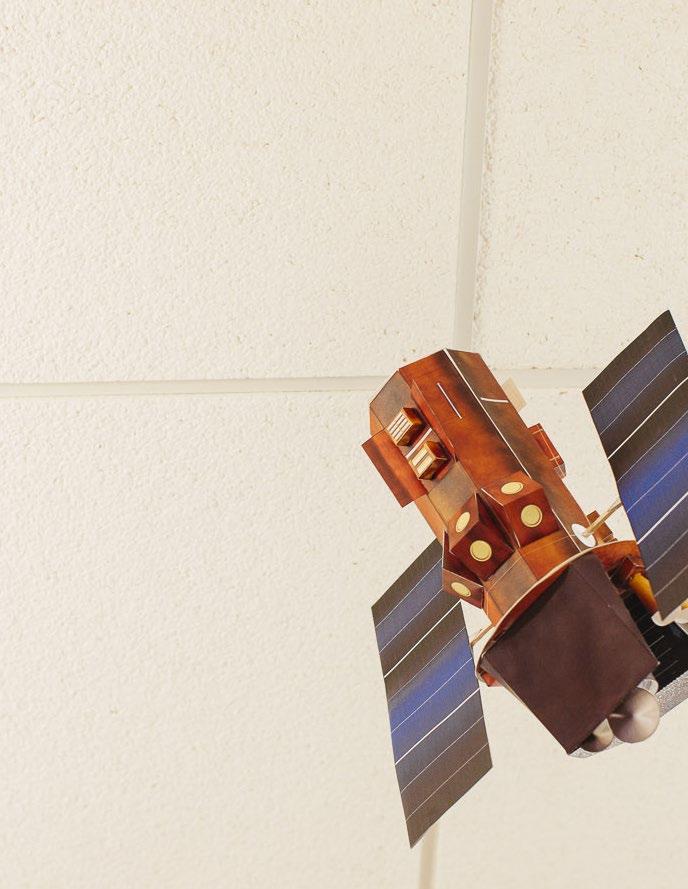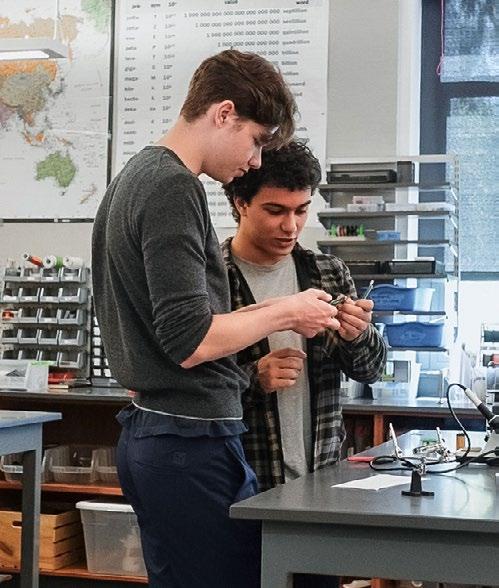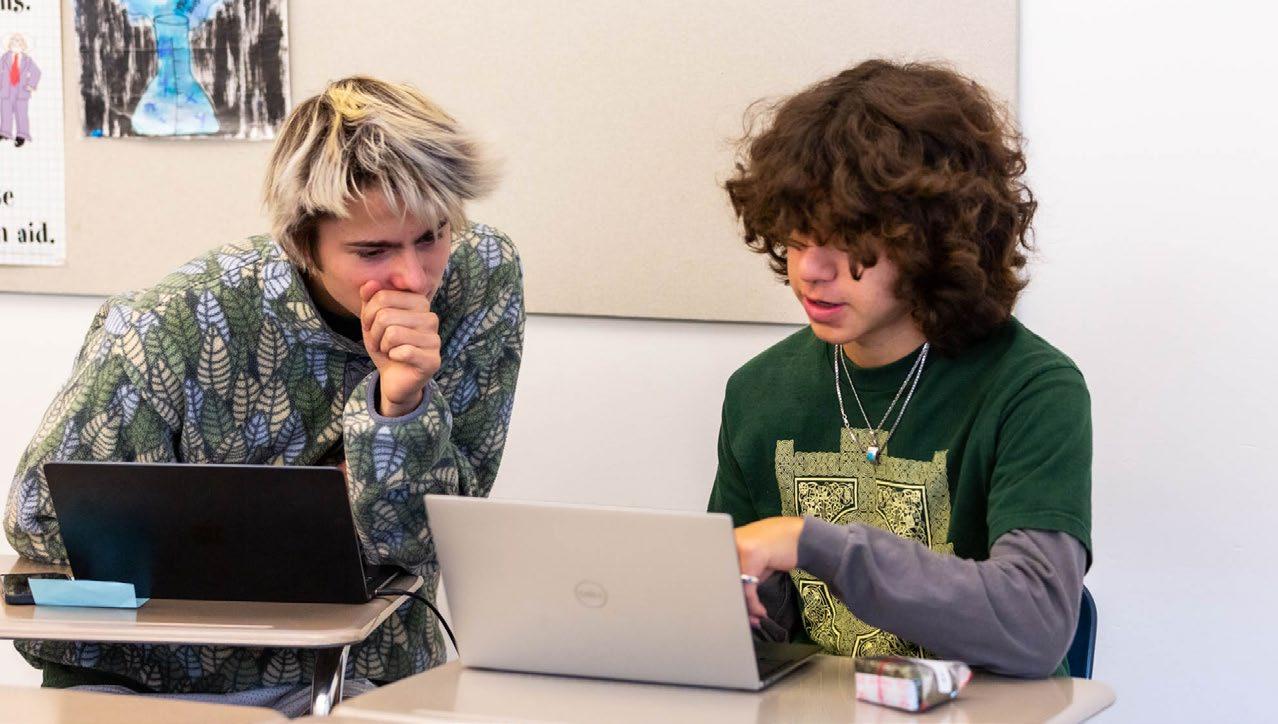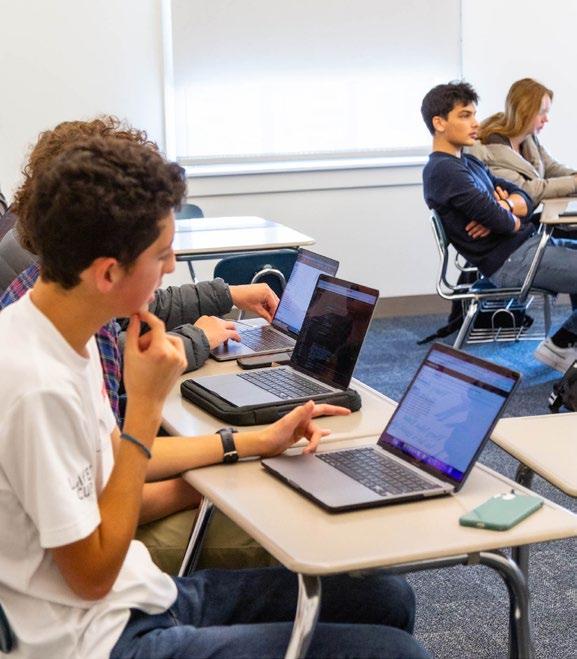
5 minute read
Embracing Innovative Technology in the Classroom
from NEXUS 2023
MA integrates technology throughout our curriculum, allowing students to utilize it in various ways. Our goal is to graduate digitally-literate students who can use technology as a valuable tool for learning. We have expanded our staff to include an educational technologist to promote technology that supports excellent teaching and learning and inspire, encourage, and support faculty with creative and interdisciplinary technology projects.
During one such opportunity, students partnered with the City of San Rafael in their Transdisciplinary Leadership Program (TLP) The Future of Cities class. They used human-centered design to create prototypes to improve the City's new data portal. The portal consisted of citywide performance dashboards to share with the community, and its design was geared more towards data experts than the general public.
As an extension of their work in that class, MA students chose to continue their work with the City in their senior projects. They were tasked with determining the right metrics to expand the City data available to the public and foster a more collaborative environment in San Rafael, including improvements in explanations of data and clearer examples of data application. Making the data more accessible to the public would further the City's desired outcomes, including increasing public trust, enabling partnerships with researchers and nonprofits, evaluating the impact of policies and programs, helping the City achieve its strategic goals, and improving its services.


Following their critical analysis of the relevance and comprehension of the existing portal, the students surveyed the public on Nextdoor to measure how the public prefers to interact with data and how they interpret visuals. They used the online prototyping tool Figma to build new dashboard user interface prototypes, engaged users in usability testing, and observed how they interacted with each version. They then presented their findings and suggestions for improvements to the portal back to the City of San Rafael.

At the completion of their project, the students received amazing feedback from their technology and community partners. When Figma learned about the prototype the students created using their product, they were impressed and planned to use it as one of their project examples. After reviewing the research from this project, the City of San Rafael took the deliverables back to their internal design team and offered the students an internship on the spot.
Additionally, these seniors exhibited their findings to the MA community in their Designing Technology End-ofYear workshop. MA's end-of-year, or culminating, projects are inter- and transdisciplinary, experiential programs that are designed to target the academic goals and represent the deeply held values of Marin Academy that run through our philosophy, mission statement, and strategic vision. Students spend three days leading and engaging with their peers for a meaningful conclusion to each school year.
Workshop participants were introduced to user testing, where real users interact with a product and give their feedback on how it performs and the process developers use to design the visual interfaces and interactive elements of apps and websites. Attendees were invited to participate in hands-on learning in user testing by playing a gaming platform of their choice and discussing the game's user experience with the rest of the group.

Many other MA teachers are bringing innovative technologies into the classroom. All our math classes use some ed tech; for example, most use the online graphic calculator Desmos to help strengthen ideas and obtain visuals to back up written work. Students in our Marin Academy Research Collaborative are doing real world work with tools such as Python and R as they help their research sponsors do real science, and our Learning Services team has a suite of tools they encourage students to use to make learning more accessible. Our Design Lab connects students across disciplines to a wide array of digital fabrication tools to bring abstract ideas into the real world, and we have a new digital drawing class this school year. Additionally, last year's Conference on Democracy focused on investigating the digital age and how it intersects with democracy. In the spring of 2024, we will incorporate a new Digital Technology and Society class into the curriculum, which will push students to deeply and critically explore these topics.
One of our goals is how to incorporate AI into the classroom so it is used responsibly. According to Director of Technology, Kyle Vitale , "With the rise of AI tools such as ChatGPT and DALL-E, students now have access to powerful and unprecedented ways to create written and visual content. At MA we want students to understand how to leverage these tools as well as their impact on society, be it positive or negative."
Marin Academy is in the process of developing technology competencies and standards and determining how to implement them into the curriculum in a systematic way. We will examine what technology skills teachers need and the competencies we want students to have. We will continue to embrace the usage of innovative technology in the classroom as we push the boundaries of educational excellence.












